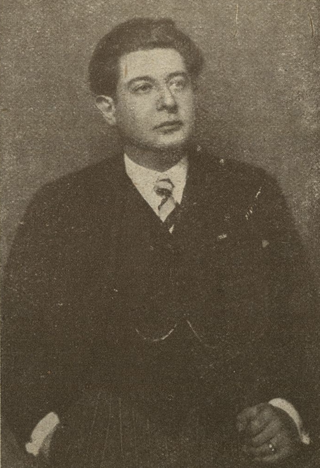Heinrich Eduard Jacob

Personalia
Born:
Died:
Profession:
Persecution:
Imprisonment 22.03.1938 - 02.04.1938,
Dachau concentration camp 02.04.1938 - 22.09.1938,
Buchenwald concentration camp 22.09.1938 - 10.02.1039,
Emigration to the USA in April 1939
KZ Number:
Memberships
Curriculum Vitae
Heinrich Eduard Jacob was born in Berlin-Friedrichstadt as the second son of the Jewish bank director and editor-in-chief of the Deutsche Konsularzeitung Richard Jacob and his Jewish wife Martha Jacob, née Behrendt, daughter of a manor owner. After her parents divorced in 1895, her mother married the Viennese banker Edmund Lampl in the same year and moved to Vienna in 1898. She had another daughter with Edmund Lampl.
With his older brother Robert Jacob and his half-sister Alice Lampl, Jacob grew up in an educated middle-class family of the old German-Jewish intellectual world. After attending grammar schools in Berlin and Vienna, he graduated from the Askanisches Gymnasium in Berlin and began studying German, literature, history and musicology at the Königliche Friedrich-Wilhelms-Universität zu Berlin.
Already during his studies, he was in close contact with the Berlin circle of early Expressionists. He became friends with Georg Heym, whose first poems he published in the Berlin-Charlottenburg weekly "Herold". From April 1912, he was a theater critic for the Deutsche Montagszeitung.
In 1912, he published his first collection of novellas Das Leichenbegängnis der Gemma Ebria, in 1915 the diary Reise durch den belgischen Krieg and in the last year of the war his first novel under the title Der Zwanzigjährige.
During the Weimar Republic, Heinrich Eduard Jacob worked primarily as a journalist and feuilletonist. In September/October 1926, as a delegate and special correspondent for the Berliner Tageblatt, he took part in the international film congress in Paris, which had been convened at the instigation of the League of Nations and dealt with the new medium of film as a propaganda tool. Heinrich Eduard Jacob uses a film about a Corsican robber chief, Romanetti, produced in 1924 and released in cinemas on July 2, 1926, as an example of a prevented hate film. Le Roi du maquis. In his novel Blut und Zelluloid (1929), Jacob adapted the Paris Film Congress and the film about the robber chief.
From 1927 to 1933, Heinrich Eduard Jacob was head of the Central European Bureau of the Berliner Tageblatt in Vienna. In 1930, he was accepted into the masonic lodge "Humanitas" of the Grand Lodge of Vienna [today: Grand Lodge of Austria of Ancient, Free and Accepted Masons]. He also published a series of novels, short story collections and plays. After the National Socialists seized power in Germany, Heinrich Eduard Jacob lost his position at the Berliner Tageblatt in March 1933. He then lived as a freelance writer in Vienna and concentrated his literary and literary studies work on biographies and non-fiction.
On the occasion of the XI International PEN Congress in Ragusa (Dubrovnik), he took a front row stand against the National Socialist writers, thereby contributing to the split in Austrian PEN. During his subsequent efforts - together with Raoul Auernheimer, Paul Frischauer and others - to persuade the "Völkische" to leave PEN, a controversy arose with Stefan Zweig, who was very hesitant. His narrative works were on the list of unwanted books during the National Socialist era.
As a staunch opponent of National Socialism and a freelance writer, he witnessed the downfall of free and independent Austria on March 12, 1938, with the invasion of the German Wehrmacht. On March 22, 1938, he was finally arrested and his extensive library and private correspondence, as well as his other belongings, were confiscated. He was deported to the Dachau concentration camp on April 2, 1938 on the so-called Prominent Transport and from there to the Buchenwald concentration camp on September 22, 1938.
Through the constant efforts of his future wife Dora Angel-Soyka, sister of the Austrian poet Ernst Angel and married in his first marriage to the Viennese writer Otto Soyka, and with the help of an American uncle, Michael J. Barnes, a brother of Jacob's mother, it was possible to make his departure possible. He was released from Buchenwald concentration camp on January 10, 1939, married Dora Angel in Vienna on February 18, 1939 and emigrated with her to the USA via Great Britain in April 1939. There he settled in New York and wrote for German-language exile magazines, such as the Jewish weekly Aufbau, but also for the New York Times. His mother, who remained in Austria, was murdered by the National Socialists in the Theresienstadt concentration camp.
In New York, Heinrich Eduard Jacob witnessed the liberation of Austria by the Allies in May 1945. He had already become an American citizen on February 28, 1945.
In the summer of 1953, Heinrich Eduard Jacob returned to Europe and also spent some time in Germany and Austria. Overall, however, his life since 1938 was characterized by great restlessness and he and his wife moved from hotel to hotel. His failing health, mainly due to his internment in the concentration camps, prevented him from writing any further literary works from 1959 onwards.
Places
Residence:
Persecution:
Citations
Dokumentationsarchiv des österreichischen Widerstands (DÖW)
Wikipedia unter de.wikipedia.org/wiki/Heinrich_Eduard_Jacob
